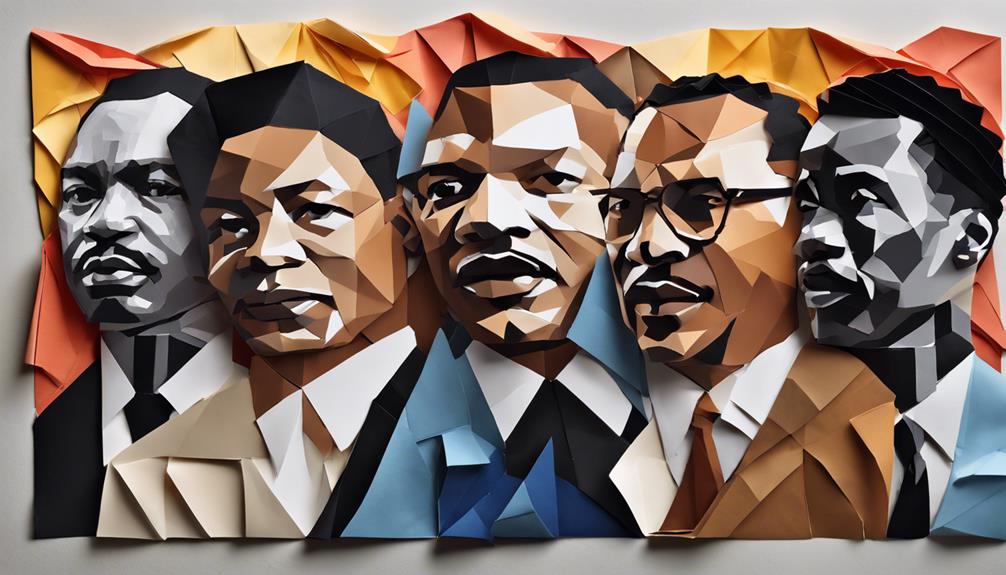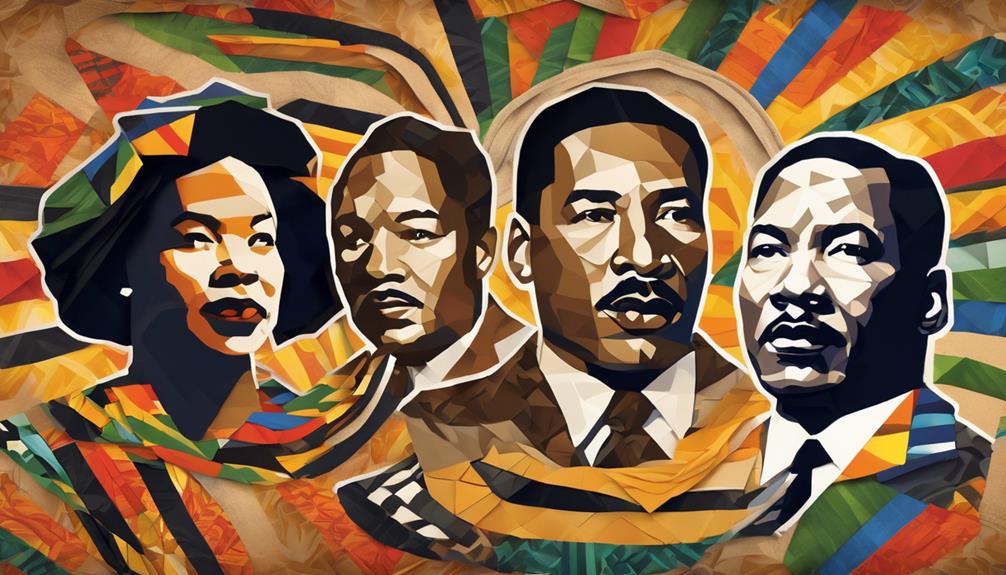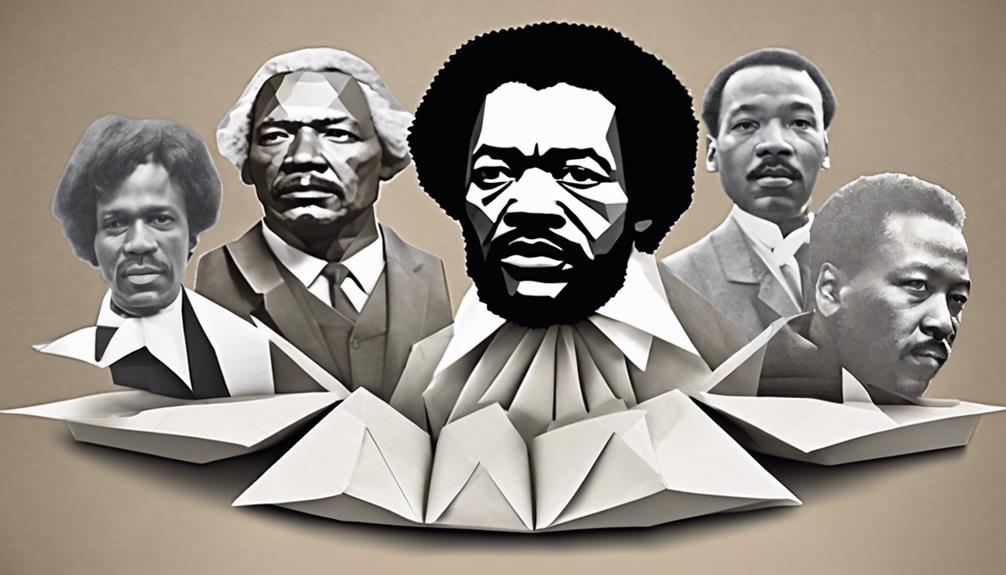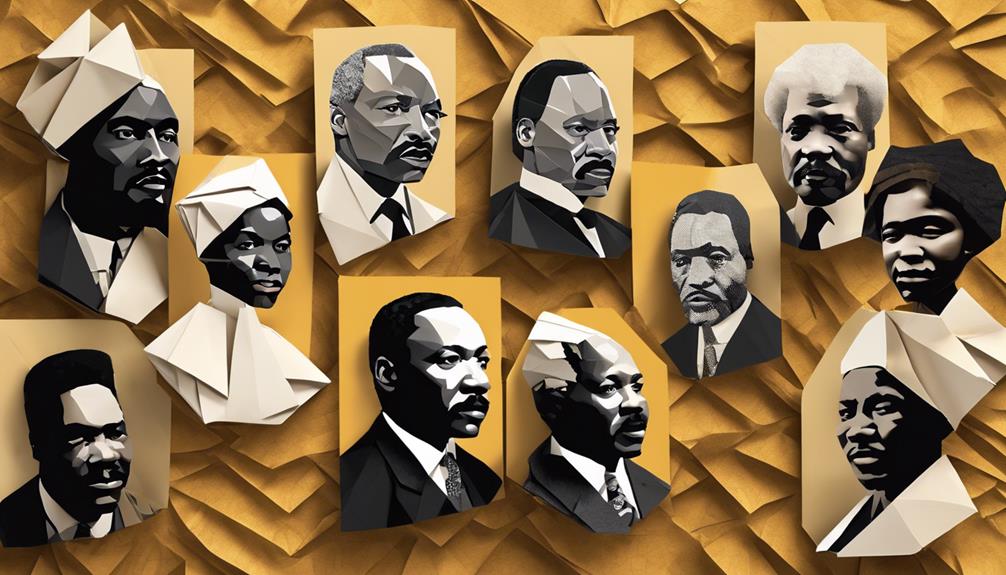You're about to discover the influential Black speakers who made a profound impact on the world. From Civil Rights champions like John Lewis and Rosa Parks, to literary icons like Toni Morrison and Maya Angelou, these individuals used their voices to fight for justice and equality. Trailblazers like Daisy Bates and Bayard Rustin organized movements and mentored others to stand up for their rights. Unstoppable forces like Frederick Douglass and Sojourner Truth dedicated their lives to activism and advocacy, shaping a more equitable society. As you explore their stories, you'll uncover the profound ways they continue to inspire change.
Key Takeaways
- John Lewis, Malcolm X, and Rosa Parks were instrumental in the Civil Rights Movement, risking everything to fight against systemic racism and oppression.
- Toni Morrison and Maya Angelou used their writing to address issues of race, gender, and identity, paving the way for discussions on human rights and social justice.
- Daisy Bates, Bayard Rustin, and Sojourner Truth played pivotal roles in advocating for equality, organizing movements, and speaking out against discrimination.
- Frederick Douglass, Sojourner Truth, and Maya Angelou were unwavering in their dedication to justice, fighting against racial segregation and discrimination through activism and advocacy.
- These influential Black speakers in history continue to inspire future generations to advocate for justice, equality, and human rights, leaving a lasting impact on the world.
Powerful Voices for Change
Throughout history, powerful black speakers have used their voices to challenge the status quo, inspire change, and bring marginalized communities to the forefront of the conversation.
As an American, you may be familiar with the Civil Rights Movement, which was fueled by the passionate words of Black Leaders who fought for social justice. These African Americans, like Daisy Bates, used their platforms to advocate for equality and challenge the status quo.
As a public speaker, Bates inspired many, including the Little Rock Nine, and even spoke at the historic March on Washington. Her voice, along with others, helped shape the movement and bring about change.
Today, their legacies continue to inspire and empower Black communities to pursue a more just society. As you learn about these powerful voices, remember that their words have the power to inspire and create change.
Champions of Civil Rights

As you explore the stories of these champions of civil rights, you'll uncover a network of passionate individuals who dedicated their lives to challenging systemic racism and fighting for social justice.
In the United States, African Americans have long faced systemic oppression, and it's the brave men and women who stood up against it that we celebrate today. Civil rights activists like John Lewis, Rosa Parks, and Malcolm X risked everything to bring attention to the struggles of Black Americans. They organized, protested, and spoke out against the injustices that plagued their communities.
Malcolm X, in particular, advocated for black empowerment and self-defense strategies in the face of racial discrimination. These champions of civil rights have paved the way for a more equitable society, and their legacy continues to inspire generations to come.
As you explore more deeply into their stories, you'll be reminded of the power of courage, resilience, and determination in the pursuit of a more just world.
Literary Giants and Activists

Beyond the front lines of protests and demonstrations, a group of literary giants and activists used their words to challenge racial injustices and inspire social change.
You may have heard of Toni Morrison, an acclaimed American novelist, poet, and essayist, who tackled themes of race, gender, and identity in her powerful writing.
As a civil rights activist, Daisy Bates played an essential role in mentoring the Little Rock Nine, the first African American students to integrate a previously segregated school. She also spoke at the March on Washington, offering solutions to the pressing issues of her time.
Bayard Rustin, another key figure, organized the March on Washington and advocated for nonviolent protest and social change.
Malcolm X, a prominent civil rights activist and minister, challenged racial segregation and promoted Black empowerment through his speeches and actions.
These literary giants and activists used their words to advance human rights and social justice, paving the way for future generations.
This Black History Month, let's honor their legacy and continue to work towards a more equitable society.
Trailblazers in Their Fields

Among the many trailblazers in their fields, several African American speakers have made significant contributions to their respective professions, breaking down barriers and paving the way for future generations.
You'll find remarkable individuals like Daisy Bates, who played a critical role in the Civil Rights Movement as a journalist, activist, and mentor to the Little Rock Nine.
Toni Morrison, a celebrated novelist, poet, playwright, and essayist, left an indelible mark on literature and African American culture.
Bayard Rustin, a pioneering gay civil rights activist, organized the historic March on Washington, further solidifying his place in Black history.
These trailblazers have inspired countless others to follow in their footsteps, shaping the course of history. By exploring the lives and achievements of these remarkable individuals, you'll gain a deeper understanding of the struggles and triumphs that have defined the African American experience.
Unstoppable Forces for Justice

You're about to meet the unstoppable forces for justice who refused to be silenced, their unwavering dedication to the fight for equality and human rights leaving an indelible mark on history.
These courageous individuals fought tirelessly for civil rights, challenging racial segregation and discrimination in all its forms.
Some notable figures in this fight for justice include:
- Daisy Bates, a journalist and activist who played a pivotal role in the integration of Central High School in Arkansas
- Bayard Rustin, a gay civil rights activist who organized the March on Washington, advocating for civil rights and social justice despite facing discrimination for his sexual orientation
- Malcolm X, a prominent civil rights activist and minister who advocated for Black empowerment and challenged racial segregation as a member of the Nation of Islam
These individuals, along with others, have paved the way for a more just and equitable society.
Their unwavering commitment to the fight for human rights has inspired generations to continue the struggle for equality and social justice.
Courageous Leaders Who Inspire

As you explore the lives of courageous leaders who inspire, you'll discover the transformative power of unwavering voices and unshakeable moral courage.
You'll learn how these trailblazers, who refused to be silenced or intimidated, inspired countless others to stand up for their rights and fight for justice.
Through their stories, you'll gain a deeper understanding of the importance of standing firm in the face of adversity and speaking truth to power.
Unwavering Voices Matter
Through their unwavering voices, courageous leaders like Daisy Bates, Toni Morrison, Bayard Rustin, and Malcolm X have inspired generations to stand up for their rights and fight for social justice. These iconic figures have played a pivotal role in shaping the Civil Rights Movement, advocating for Education and Equality for Black Americans.
As you explore their stories, you'll discover how they used their voices to challenge the status quo and push for Integration, Activism, and Social Justice.
Here are just a few ways these leaders have made a lasting impact:
- Daisy Bates mentored the Little Rock Nine, paving the way for Integration in education.
- Toni Morrison used her literary voice to explore themes of Racial Pride and Social Justice, inspiring a new generation of writers and activists.
- Bayard Rustin and Malcolm X organized marches and protests, using their voices to demand Equality and challenge systemic racism.
Their unwavering voices matter, and their legacies continue to inspire us to stand up for what's right.
Unshakeable Moral Courage
With unwavering determination, courageous leaders like Daisy Bates, Toni Morrison, Bayard Rustin, and Malcolm X have inspired generations to stand up for their rights, demonstrating unshakeable moral courage in the face of adversity.
You, too, can draw inspiration from their examples as you navigate your own path to creating change. As a civil rights activist, Daisy Bates mentored the Little Rock Nine and spoke at the March on Washington, advocating for education as a catalyst for change.
Toni Morrison, a renowned novelist and playwright, used her writing to shed light on the Black American experience, earning her the Presidential Medal of Freedom.
Bayard Rustin, a gay civil rights activist, organized the March on Washington, and Malcolm X fought tirelessly for Black empowerment and social justice. These leaders have shown that, despite the obstacles, you can make a difference through education, activism, and unwavering dedication to your cause.
As you endeavor to create positive change, remember that their courage is a beacon of hope, guiding you towards a brighter future.
Frequently Asked Questions
Who Are the Black People Who Impacted the World?
You're wondering who the black people are who impacted the world. From journalists to activists, they've made their mark. You'll find trailblazers like Daisy Bates, Toni Morrison, Bayard Rustin, and Malcolm X, who fought for equality and left a lasting legacy.
Who Are the Most Famous Black Activists?
You're looking for the most famous black activists, and you'll find trailblazers like Malcolm X, Bayard Rustin, and Daisy Bates, who fought tirelessly for civil rights, social justice, and human equality, leaving an indelible mark on history.
What Is the Most Famous Black Speech?
You're likely thinking of Martin Luther King Jr.'s iconic "I Have a Dream" speech, delivered during the March on Washington in 1963, which remains one of the most famous and influential speeches in American history.
Who Are the Significant Black Figures From the Present Day?
You're probably thinking, "Who are the modern-day trailblazers?" Well, let's shine a light on Amanda Gorman, Nipsey Hussle, Bakari Sellers, and more, who are using their voices to spark change, inspire, and empower, leaving a lasting impact on our world today.
What Impact Did Famous Black Speakers in History Have on the Current Generation of Speakers?
The impact of famous black speakers making waves in history continues to inspire and empower the current generation of speakers. Their powerful messages of resilience, equality, and justice have paved the way for a new era of public speaking that celebrates diversity and amplifies diverse voices in our society.
Conclusion
As you reflect on these iconic black speakers, remember that their words weren't just rhetoric – they sparked movements, shattered barriers, and inspired generations.
Their legacies are a reminder that your voice, too, has the power to challenge, to uplift, and to change the world.
So, don't be silenced, don't be intimidated, and don't be afraid to speak truth to power – the world needs your voice, now more than ever.









